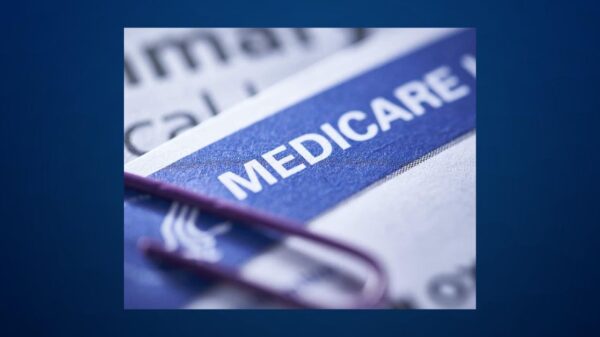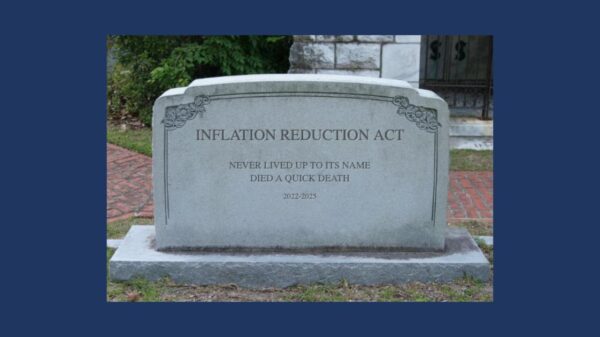The 2022 United States Senate elections can best be thought of as the classic battle between the irresistible force and the immovable object. The irresistible force is the playing field. President Joe Biden’s job approval in the RCP Average is currently 39.7 percent, the lowest of his presidency. That’s about 3.5 points lower than Barack Obama’s job approval was on (midterm) Election Day 2010. President Obama’s job approval only dipped to 40 percent briefly, in the immediate aftermath of the botched Obamacare rollout, and it never dropped below 40 percent. President Donald Trump’s job approval spent much of 2017 below this mark, but in the terrible Republican election year of 2018, it never fell this low.
In other words, this is shaping up to be a worse environment than either of the last three midterms, all of which were nightmares for the party in power.
But the immovable object is real as well: To say that the GOP has failed to field its top team is an understatement. It failed to recruit its preferred candidates in almost every marquee race, including significant failures in New Hampshire, Maryland, Colorado, and Arizona. This deficiency intersects with a reasonably unfavorable map for Republicans; Democrats aren’t defending a single seat in a state that Joe Biden lost, and they have opportunities against Republicans in two states that went for the president in 2020.
Twenty years ago, it would have made more sense to emphasize the immovable object when high quality candidates routinely won in states whose underlying political orientation heavily favored the other party. But that isn’t really how elections work right now. Although candidates matter, they rarely outrun their president’s job approval by more than a handful of points. Almost all polling in the swing states has shown President Joe Biden’s job approval languishing in the high 30s or low 40s. It’s one thing to ask candidates to run five points ahead of their president’s job approval. But 10 points or more? If their name isn’t Joe Manchin or Susan Collins, it probably isn’t happening .
With that background, here are the Senate seats most likely to flip in 2022.
Honorable Mention, Alaska (Lisa Murkowski): Democrats have effectively conceded this seat, but Murkowski might still be the most vulnerable incumbent up for reelection this year. Probably the only thing keeping her in the game as a fairly moderate senator from a decidedly red state is that the state’s ranked-choice voting procedures in the general election will give strategic-minded Democrats an opportunity to vote for her as their second choice against the more conservative Kelly Tshibaka. While this gives her a path to victory that she probably lacks in a closed primary, it also creates headaches for her; the more she does to court Democrats, the more she alienates the more numerous Republicans in the state.
Tier III Races
11. Washington (Patty Murray): This could rise up the ratings by the end of the cycle depending on how things play out. Republicans are high on their likely nominee, Tiffany Smiley, and Sen. Murray’s polling has been wobbly enough that she bought television time. This is still a very Democratic state, and Murray survived in 2010 when it was more Republican. At the same time, it is closer to the center than Missouri, and only a point or two further out from the center than Ohio. If former Gov. Eric Greitens loses the Missouri primary, this race probably goes into the top 10, but for now it’s on the outskirts of competitiveness.
10. Ohio (Open seat): Ohio certainly isn’t a recruiting failure for Democrats – Rep. Tim Ryan has perennially been on the recruiting list for Democrats and is probably the strongest they could field. Republicans have nominated author J.D. Vance. The “Hillbilly Elegy” author is well-known but untested, and in the right year this seat could be vulnerable for the GOP. But this is not the right year.
9. Missouri (Open seat): Twenty years ago Missouri was a classic swing state, but with the “Missouruh” portion of the state moving solidly into the GOP column over the past two decades, that tradition is a thing of the past. This is now a Republican state. At the same time, Republicans are locked in a competitive primary, with a potentially problematic candidate waiting in the wings with Eric Greitens leading narrowly in polls. Greitens has been dogged by a variety of allegations of sexual improprieties and spousal abuse, and he was facing likely impeachment and removal before resigning in 2018. Democrats would definitely choose to face off against him, and if he wins the nomination this race could move up the ratings. But he isn’t the nominee yet, and even if he is, the potential Democratic nominees are probably too far to the left for the state. Overall, the environment and lean of the state would probably leave the race as a tossup at best.
8. Colorado (Michael Bennet): Colorado is one of those states that elections analysts regularly overlook, mostly because of its notable failures for Republicans over the course of the past decade. But the state only leans toward Democrats by a handful of points, and many Republican failures in the past decade are classic “own goals,” as with Ken Buck’s repeated gaffes and Scott McInnis’ decision to plagiarize an article. This is still a state that Donald Trump lost by only five points in 2016, and where an obscure GOP challenger came within six points of defeating Sen. Michael Bennet the same year. To be sure, 2020 was much worse for Republicans there. We can debate how much of that is Trump-specific but the point is moot; the GOP failed to lure a top-tier challenger into the race, and it is likely only flipping if the bottom truly falls out for Democrats. A missed opportunity for Republicans.
Tier II Races
7. North Carolina (Open seat): While Democrats have continued to have success in the Tar Heel state at the state level, at the federal level it has been a series of near misses for them: Since Barack Obama carried the state in 2008, Republicans have won every presidential and Senate race in the state by less than six points. With Richard Burr retiring, North Carolina would theoretically be a great pickup opportunity for Democrats, but Republicans have a legitimate candidate in Rep. Ted Budd, and the environment is likely too toxic for former state Supreme Court Chief Justice Cheri Beasley (who lost a state Supreme Court race in a much more favorable environment in 2020) to have much of a chance.
6. New Hampshire (Maggie Hassan): Republicans had hoped that Gov. Chris Sununu would run against Hassan, a former governor serving her first term in the Senate. Had he done so, this would probably be the most likely seat to flip. But he didn’t, and Republicans have a crowded primary where no candidate has yet raised a million dollars, against a fixture in New Hampshire politics for the past decade who has raised $21 million. But Hassan’s polling has been weak, even against relatively unknown challengers. This could still be a top-tier race by November.
5. Wisconsin (Ron Johnson): We can debate which tier this race belongs in, although Johnson certainly seems intent on doing his level best to make this a top-tier race. But Democrats face a crowded primary and Wisconsin is a swing state now, where the Democratic slate barely prevailed in a great Democratic environment in 2018. This could turn out to be close, but it doesn’t look that way now.
Tier I Races
4. Pennsylvania (Open seat): Distinguishing among the remaining races is tricky; all have a decent claim to the top spot, and all have solid reasons why they belong nearer to the second tier than the top. Pennsylvania has turned out to be something of a worst-case scenario for Republicans. The party failed to attract a top-tier candidate, leaving Dr. Mehmet Oz (of Oprah Winfrey fame) and hedge fund CEO Dave McCormick as the leading GOP candidates. Oz then emerged from the primary as the leader by just 910 votes. Making matters worse for Republicans, they nominated Doug Mastriano as their gubernatorial candidate, whose erratic behavior threatens to doom the entire GOP ticket.
But Lt. Gov. John Fetterman, the Democratic nominee, has problems of his own, including potentially serious health issues and claims that he stopped a black jogger at gunpoint. This is also a state where, absent a turnaround in national politics, the Democratic nominee is likely going to have to win around 20% of voters who disapprove of the president’s job performance. This is a Herculean task, and it isn’t clear Fetterman is the right candidate to pull it off.
3. Georgia (Raphael Warnock): Herschel Walker, the Republican nominee, is not the candidate most Republicans wanted leading the charge against Sen. Raphael Warnock, the charismatic pastor who won a special election to give Democrats control of the Senate in 2021. Walker is a political novice who faces a flurry of stalking allegations and other claims of violence toward women, as well as embellishing his resume. But Walker, a star University of Georgia football player in the 1980s, is a legend in much of the state, and has managed to stay on message for most of the cycle so far. Moreover, with Warnock and Stacey Abrams on the Democratic ticket, this is one state where Democrats definitely don’t have to worry about a drop-off in African American turnout.
Georgia has been trending toward Democrats, but some of the swing in 2020 was likely Trump-specific and it was still a couple points to the right of the country as a whole. Warnock already trails in the polls, and in this environment it will be difficult for Warnock to hold on to the seat.
2. Arizona (Mark Kelly): Arizona has trended sharply toward Democrats the past few cycles. Mitt Romney carried the Grand Canyon State by nine points in 2012, but Donald Trump won by just three points in 2016 before losing it by a fraction of a point in 2020. During this time, Republicans lost both Senate seats as well, also narrowly. Arizona is largely a suburban state, and with the suburbs swinging against the GOP nationally, the impact of perceived Democratic Party shortcomings is felt more here.
The Republican frontrunner is unclear, but all of the contenders have been outraised by Sen. Kelly, a popular former astronaut, who picked up the seat in 2020 and now has to defend it just two years later. Kelly is a solid incumbent who has most other things going for him except for the overall political environment. If Biden’s job approval were to rise, or if the GOP were to nominate a problematic candidate, this race would probably move down the rankings quickly. For now, however, Kelly is in deep danger.
1. Nevada (Catherine Cortez Masto): After moving sharply toward Democrats during the 2000s, Nevada has swung back toward the GOP over the past few cycles. Cortez Masto defeated Congressman Joe Heck by just 2.5 percentage points, and Biden beat Trump by a similar margin in 2020, despite winning by almost double that margin nationally. While Adam Laxalt isn’t necessarily the GOP’s top choice, he has a famous family name, and no trouble fundraising. In the terrible Republican year of 2018, he lost by only four points. The polling has generally shown Cortez Masto languishing in the low-to-mid 40s, which is a dangerous place for an incumbent to dwell. Overall, the incumbent is weaker and the challenger stronger than in Georgia, and the state (for now) lacks the internecine feuds that beset the state parties in the other top-tier races. That’s ultimately what earns this race top billing. Were Laxalt to lose to his main primary opponent, disabled Afghanistan war veteran Sam Brown, this race could tighten.
Sean Trende is senior elections analyst for RealClearPolitics. He is a co-author of the 2014 Almanac of American Politics and author of The Lost Majority. He can be reached at strende@realclearpolitics.com. Follow him on Twitter @SeanTrende. This piece originally ran at RealClearPolitics.





















